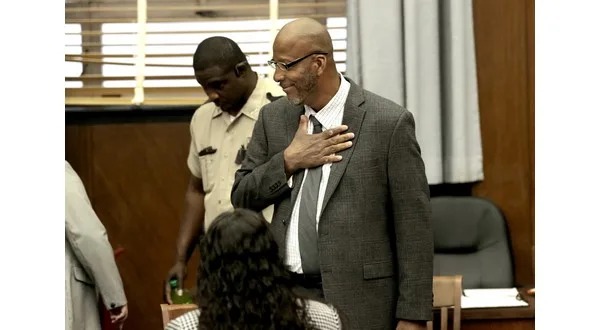
Christopher Dunn arrives in court Tuesday at the Carnahan Courthouse in St. Louis. A St. Louis judge is now deciding the fate of Dunn, who has been imprisoned more than three decades for a murder he says he didn’t commit. St. Louis Circuit Attorney Gabe Gore believes him and requested the hearing to determine if Dunn’s conviction should be vacated. It isn’t clear when Judge Jason Sengheiser will issue a ruling. The two-day hearing concluded Wednesday. (Photo courtesy of St. Louis Post-Dispatch via Associated Press)
ST. LOUIS (AP) – A St. Louis judge will soon decide the fate of a Missouri man who has spent more than three decades in prison for a killing he says he didn’t commit.
Christopher Dunn was convicted of first-degree murder in the 1990 shooting death of 15-year-old Ricco Rogers. St. Louis Circuit Attorney Gabe Gore believes Dunn was wrongfully convicted, and requested a hearing before Judge Jason Sengheiser. It concluded Wednesday.
“In this case, your honor, there simply remains no evidence at all,” Gore said, the St. Louis Post-Dispatch reported.
The Missouri Attorney General’s Office opposed the effort to vacate Dunn’s conviction. Lawyers for the state said that initial testimony from two boys at the scene who said Dunn was the shooter was correct, even though they later recanted as adults.
“That verdict was accurate, and that verdict should stand,” said Assistant Attorney General Tristin Estep.
Both sides will now submit written arguments to Sengheiser. It isn’t clear when he will decide.
A Missouri law adopted in 2021 allows prosecutors to request hearings when they see evidence of a wrongful conviction. Gore filed a motion in February seeking to vacate the guilty verdict, citing “clear and convincing evidence of Christopher Dunn’s actual innocence.”
While Attorney General Andrew Bailey’s office is not required to oppose such efforts, he also opposed another major effort in St. Louis when Lamar Johnson was freed last year after serving 28 years for a murder a judge ruled he was wrongfully convicted of.
Dunn was convicted based largely on the testimony of 14-year-old DeMorris Stepp and 12-year-old Michael Davis Jr., who said they witnessed the shooting but later recanted.
Rogers was shot to death on May 18, 1990, when a gunman opened fire while he was with a group of other teenage boys outside of a home. Davis and Stepp immediately claimed Dunn was the shooter.
In a recorded interview played Tuesday in court, Davis said he lied because he thought Dunn was affiliated with a rival gang.
Stepp’s story has changed a few times over the years, Gore said at Wednesday’s hearing. He has most recently said he did not see Dunn as the shooter. Gore said another judge previously found Stepp to be a “completely unreliable witness” and urged Sengheiser to discount him altogether.
Dunn has said he was at his mother’s home at the time of the shooting. Childhood friend Nicole Bailey testified that she spoke with Dunn by phone that night. She said Dunn was speaking on a phone at his mother’s house.
Estep, the assistant attorney general, said Dunn’s alibi could not be trusted. She said his story has shifted multiple times over the years. Dunn did not testify at the hearing.
The 2021 law has resulted in the the release of two men who each spent decades in prison. In addition to Johnson, Kevin Strickland was freed in 2021 after more than 40 years for three killings in Kansas City after a judge ruled he had been wrongfully convicted in 1979.
WebReadyTM Powered by WireReady® NSI










